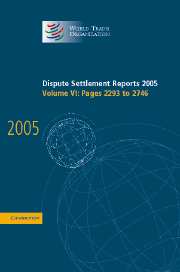United States – Subsidies on Upland Cotton (WT/DS267): Table of Annexes J to O
Published online by Cambridge University Press: 12 December 2017
Summary
Article 13 of the Agreement on Agriculture
Australia has argued that Article 13 of the Agreement on Agriculture is an affirmative defence. How do you reconcile this with your view that the conditions in Article 13 are a “prerequisite” to the availability of a right or privilege? Australia Would other third parties have any comments on Australia's assertion? 3rd parties, in particular Argentina, Benin, China, Chinese Taipei
Argentina agrees with Australia that Article 13 of the Agreement on Agriculture is an affirmative defence and that in these proceedings the United States therefore carries the burden of proof on the question of whether its subsidies conform with the terms of Article 13.
According to the Appellate Body in US-Shirts and Blouses:
” … the burden of proof rests upon the party, whether complaining or defending, who asserts the affirmative of a particular claim or defence. If that party adduces evidence sufficient to raise a presumption that what is claimed is true, the burden then shifts to the other party, who will fail unless it adduces sufficient evidence to rebut the presumption”.
As stated by Brazil in Paragraph 112 of its first written submission, in the case of claims of violation of the positive obligations of the WTO Agreement, it is the complaining party that has the burden of providing a prima facie case of violation. However, in the case of affirmative defences, such as Articles XX and XI:2(c)(i), the Appellate Body itself established that it is only reasonable that the burden of establishing such a defence should rest upon the party asserting it.
According to the standards established by the Appellate Body, Article 13 of the Agreement on Agriculture is a provision in the nature of an affirmative defence. As such, it does not create new obligations for Members, but limits the scope of certain provisions of the SCM Agreement and the GATT 1994 subject to certain conditions. Nor does it alter the legal nature of Members’ measures, but simply permits Members to maintain those measures exempt from actions, if the measures meet the conditions specified in Article 13(a), (b) or (c).
- Type
- Chapter
- Information
- Dispute Settlement Reports 2005 , pp. 2295 - 2746Publisher: Cambridge University PressPrint publication year: 2007

